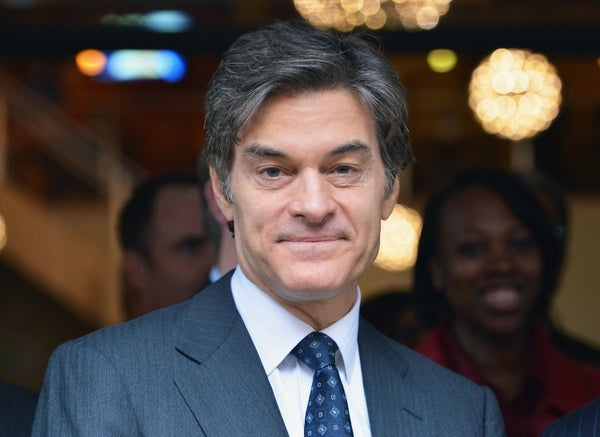This article was published in Scientific American’s former blog network and reflects the views of the author, not necessarily those of Scientific American
It’s been nearly two years since Dr. Mehmet Oz appeared before Congress, in a consumer protection hearing that attracted national media coverage. The Senate committee grilled him for making deceptive medical claims and promoting unproven weight-loss supplements on his television series, The Dr. Oz Show.
“I don’t get why you need to say this stuff when you know it’s not true,” said Senator Claire McCaskill of Missouri. “When you have this amazing megaphone, why would you cheapen your show?”
Since then, the heat on Dr. Oz has only intensified. In early 2015, a group of ten physicians sent a letter to Columbia University, demanding Dr. Oz lose his faculty position. Soon after, a poll found hundreds of physicians believe Dr. Oz should be stripped of his medical license. The American Medical Association has since announced plans to develop ethics guidelines for physicians in the media.
On supporting science journalism
If you're enjoying this article, consider supporting our award-winning journalism by subscribing. By purchasing a subscription you are helping to ensure the future of impactful stories about the discoveries and ideas shaping our world today.
During an interview with NBC last year, Dr. Oz expressed remorse, saying he wished he could “take back” some of these television segments and promising not to use exaggerated language like “miracle” anymore.
But has he changed his ways?
I decided to find out. As a fourth-year medical student, I’ll soon practice medicine in a world where voices like Dr. Oz carry enormous weight with patients. So, to prepare myself, I did something I’ve never done before. I sat on my couch, picked up the remote, and tuned in to The Dr. Oz Show.
I hoped he had reformed his show. News reports last year suggested Dr. Oz was partnering with the former Surgeon General David Satcher and encouraging more audience participation. Perhaps Dr. Oz had been humbled by these public criticisms and strengthened the medical standards of his show.
Yet, when the episode came on, these illusions were quickly discarded. Terrifying headlines burst onto the television. Sexually transmitted cancer! The letters HPV flashed like a strobe light. Can a simple kiss put you at risk? You may not even know you have it!
Amidst these apocalyptic warnings, it was hard not to fall under the show’s spell. My pulse quickened. I looked around the room, wondering if I was in danger.
A montage of Dr. Oz operating and comforting patients soon followed. Then he appeared on camera. He was here to save us. My blood pressure returned to normal. Dr. Oz spoke calmly, promising ways to protect us from this coming cancer epidemic. For the rest of the episode, he brought on medical professionals and former patients, interviewing them with charm and enthusiasm.
It was a rollercoaster of emotions, and this episode wasn’t out of the ordinary. A brief review of The Dr. Oz Show website found similarly outlandish headlines from recent episodes: Does heaven really exist? What toxins are lurking in your clothes? Flatter by Friday: One week to shrink your stomach.
Therein lies the trouble. Despite reprimands from Congress and the medical community, Dr. Oz doesn’t appear to be atoning for his mistakes. Instead he continues to prioritize entertainment over explanation and emotion over substance.
During the NBC interview last year, Dr. Oz claimed his show is “not a medical show” and is not intended to “talk about medicine.” But that simply isn’t true. Dr. Oz is a physician who uses his medical credentials as a public platform, oftentimes spreading misleading health information to vulnerable audiences. With millions of viewers every day, he remains one of the foremost voices influencing Americans’ understanding of health.
It’s a battle of ideas, with entertainment on one side and reality on the other. We have a number of public leaders to educate the nation about health matters—Surgeon General Dr. Vivek Murthy and Director of the CDC Dr. Tom Frieden, among others. The problem is these figures often can’t compete with the performances given by the likes of Dr. Oz.
Now more than ever, we need compelling spokespersons who will stand up for medical accuracy in the media. For example, Dr. Sanjay Gupta, a practicing neurosurgeon, delivers grounded health coverage as chief medical correspondent for CNN. Dr. James Hamblin has injected new youth and vigor into the field of medical journalism through his work at the Atlantic. We should encourage more journalists like them.
Medical journalism often relies on experts, but its fate rests with all of us. We can foster responsible commentary with our clicks, our viewership, and our time. Or we can give in to our need for stimulation, to our fears of hidden dangers, to the sensationalism of characters like Dr. Oz.
After turning off the television that day, I decided to go back to where it all began: Dr. Oz’s faculty page at the Columbia University website. In his profile photo, he’s smiling and wearing surgical scrubs. The page lists his affiliation with prestigious academic medical centers, his expertise in cardiothoracic surgeries, multiple research awards, and peer-reviewed publications.
I could only shake my head at the squandered opportunity.
